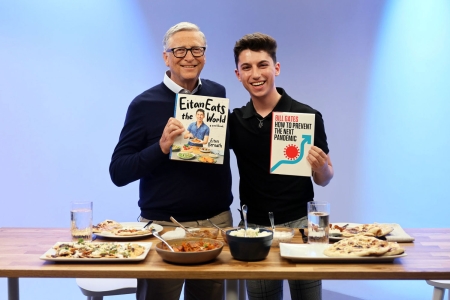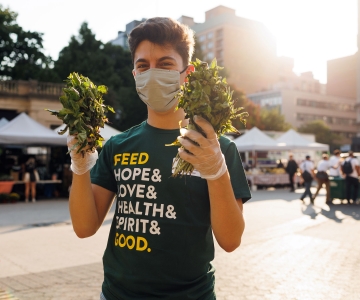Meet Eitan Bernath: Celebrity Chef, Entertainer and #ZeroHunger Advocate
You may have seen him cooking up a storm with Drew Barrymore on her daytime show, watched him preparing roti with Bill Gates on Tik Tok, or come across his recipes in The Washington Post, Saveur and Food52.
A multitalented chef, social media influencer, entrepreneur and advocate, Eitan Bernath has always been passionate about food. “My favorite part of any day is breakfast, lunch and dinner — with multiple snacks in between,” he says. In his cookbook Eitan Eats The World, he even writes that “snacking is one of my main personality traits.”
The passion for the art of cooking came after, he says, and with it, fame and a platform that allows him to reach millions of fellow foodies and young people — in the US and around the world.
Recently appointed as one of the UN World Food Programme’s High-Level Supporters, Eitan is interested in teaching people to cook better while also working to build a world with zero hunger. “If you don’t know there’s a problem, you can’t be an advocate for its solution,” he explains.
The Freerice team had a chance to chat with Eitan on his recent trip to visit WFP’s headquarters in Rome and ask him about food, fame and using his platform for good.

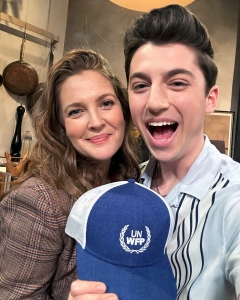
Q: You’re clearly passionate about cooking and food. Why is it important for you to talk about food insecurity?
A: When you are food secure, it is hard to understand what it means to be food insecure. Even for me, it's hard. I've never been food insecure in my life — I've been privileged. But it is something I care about, so I try to educate myself about it.
I think about the times I've been hungry and how unhappy I was, but I still knew I was going to eat food eventually. In those moments when I was most hungry in my life, I was never worried I would be hungry for too long. It was a question of "Will it be in two hours or four hours?" But when people are food insecure, they don't know when they have food coming down the line.
So I ask people: "Think about a time when you were hungry, and imagine if you just didn't know when you'd get food again." That's a way I try to think about it on a personal level. But also more broadly speaking, I think about the effects food insecurity has on people's growth and development. Someone who is food insecure can't focus in school. They can't do their best work because they're thinking about food or they're just weaker or malnourished.
Food is more than just a meal. You're giving people the ability to focus at school, to focus on their job. To focus on anything other than hunger. Because hunger just absolutely sucks the life out of you.
When you are combating food insecurity and helping people become food secure, you’re not just giving them a meal. You are giving them the ability to live their lives. It’s so impactful and the positive ripple effects are almost limitless.


Q: With over 10 million followers across your digital platforms, how do you see the power of social media?
A: The greatest part of social media is two-fold. First is access to information: information is power. Take a kid like me who grew up in Teaneck, New Jersey. I can learn about, and care about, food insecurity around the world because of how easy it is to access the information on my phone. Once you're aware of it and care about the problem, you can use the power of social media to educate others.
I'm in a position where my videos reach millions of people. But the grassroots efforts are just as important, if not more important than work that I can do on a large scale. Even teaching just one person about food security, and getting them to donate or talk to other people about it, is meaningful.
Everyone knows that there's food insecurity in the world, but not everyone knows the sheer scale of it. And with climate change, extreme weather changes and manmade conflicts, it's getting worse. Through social media, we have the power to help educate others and spread the word in a way that has never been possible before.
Tell us a little bit about your role as an activist. How do you see your responsibility?
I gain a lot of benefits from my job. I get to reach a lot of people — there's fame that comes with this job, and there's money. When you work in social media or any form of entertainment, it can be very easy to just take and take.
But my parents and my community have always taught me that it's important to share your privilege. If you have, you should give to people that don't have. That can be money, that can be your time, or in my case, that can be my platform. Because this platform is not just for my own benefit. Through it, I'm able to help change hearts and minds, and I can help people learn about important issues like food insecurity.
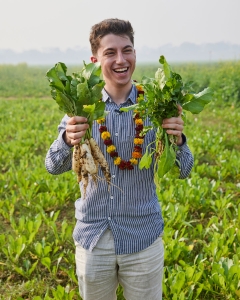
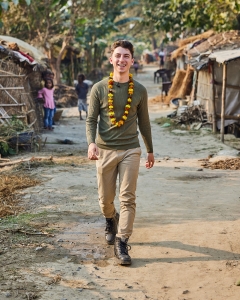
Q: What is your favorite food?
A: Indian food and culture have always been a big part of my upbringing. My best friend and next-door neighbor is Indian, and I grew up in her household. So Indian food is one of my comfort foods. And no matter where I travel, I always eat at least one meal at an Indian restaurant.
Q: And what about your favorite rice dish?
A: Wild mushroom risotto. It helps me unwind at end of a long day!

